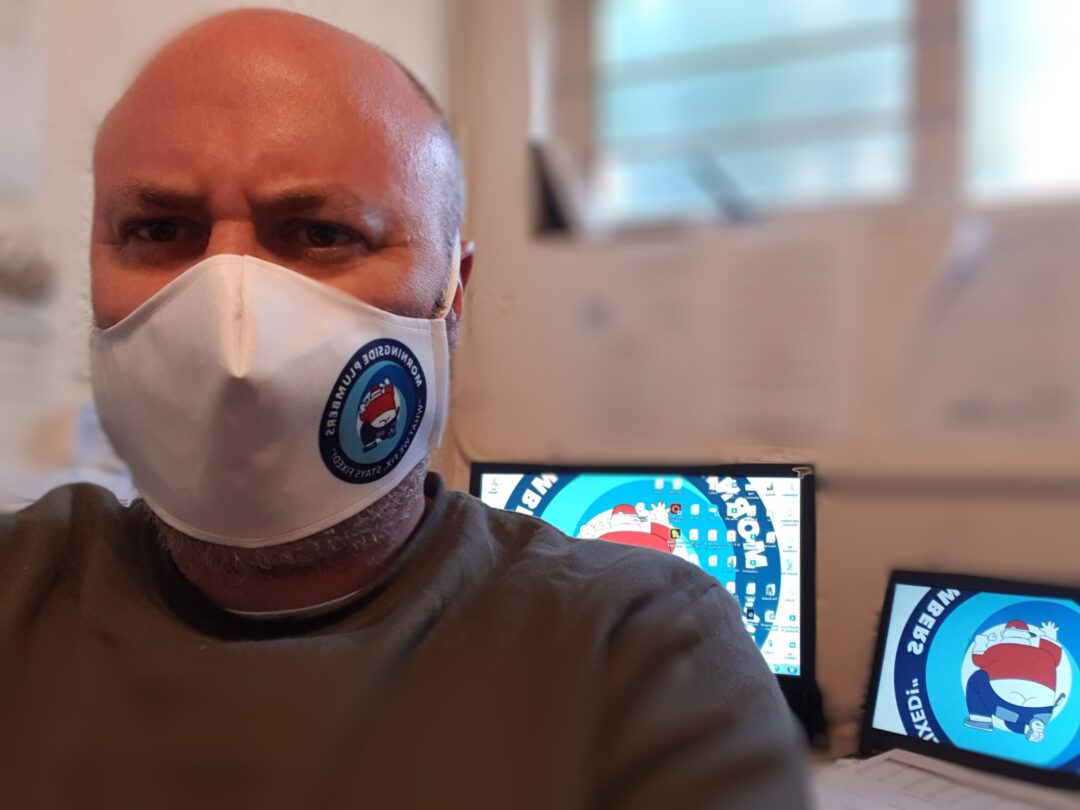Business planning
“We won’t go down without a fight.” A plumber with an MBA shares his COVID-19 business survival strategy

“By Day 5 of lockdown, when the seriousness of the economic impact started becoming clear, we knew that we had to do whatever we can to survive. We were not going down without a fight.”
As an essential services business, Morningside Plumbers fights from the trenches: sewerage.
Coronavirus is a water-borne disease that can survive up to 12 days in favourable, unsanitary conditions. In fact, water expert Dr Anthony Turton believes South Africa’s national sewerage crisis could become an accelerating factor in spreading the virus.
“I take nothing away from the doctors and nurses who are fighting this war, but my guys are also on the front line. They’re also foot soldiers. And if they’re willing to stand in the firing line, I have to do whatever I can to protect them.”
Coronavirus cash flow management
Lior Solomons is a registered and highly qualified plumber. With a BCom in Marketing and a Master’s in Business Administration, he bought Morningside Plumbers, an already established business, in 2013. Since then, he has grown his staff complement from one plumber (himself) and one assistant to six plumbers and five assistants offering domestic and commercial plumbing installation and maintenance services in the greater Johannesburg and Pretoria areas.
One of the company’s missions during Coronavirus is to bring clean drinking water and sanitation to communities, to strengthen their fight against the virus. But that means Solomons has to put his people at risk — and that’s something he doesn’t take lightly.
So, to protect his business and his staff, he devised a three-phase strategy in response to the COVID-19 lockdown: Survival, Neutrality, and Attack.
Stage 1: Survival
For the first seven to 10 days after lockdown, Morningside Plumbers went into survival mode.
“We expected turnover to drop in those initial days because there was so much uncertainty and confusion around who was allowed to trade and if households could call out plumbers. We had been monitoring the virus patterns overseas, especially in Italy. We knew it was coming to South Africa, and we tried to plan for it.”
Before lockdown, Morningside Plumbers averaged between 12 and 20 jobs a day. In the first week of lockdown, this dropped to two jobs a day.
“We had to make tough decisions, we had to become more safety concerned, and we had to become harder on our customers when it came to payment. We investigated all support options that were available to small businesses through the government and the banks and cut costs wherever we could.”
Business terms and processes changed overnight, says Solomons. “We started asking customers upfront if anyone in their household had been exposed to the virus. If the answer was ‘yes’, we’d turn away the business. We’d never done this before, but if my staff don’t feel safe around a customer at any point, they can walk away. The risks to their health are not worth it.”
To drive this point home, Solomons added a “disclaimer” to all customer invoices:
“We are soldiers in the war against the spread of this fatal disease. We view ourselves as vital in the machine that will halt this pandemic, and we’ve decided to put our own health, safety, and possibly lives on the line so that our community may survive. We ask for nothing in return except for your cooperation and strict adherence to our rules. Together, we’ll overcome this terrible situation, and we hope to not only be able to stop the spread, but also to assist in the rebuilding of our beautiful country once we emerge.”
Honesty, transparency, and trust became critical in those early days. “We understand, with compassion, that times are tough for everyone but, at the end of the day, I have to look out for myself and my staff.”
Tough decisions
It’s a Catch-22 approach, he says, because while requiring upfront payment has stabilised cash flow to some extent, it’s also impacted revenue: if customers decline to pay upfront, Morningside Plumbers may decline the job.
This put enormous cash flow pressure on the business, which affected its ability to meet supplier payment agreements. “We’ve developed strong relationships with our suppliers. We had to lean into those relationships and the trust we’ve developed over time when renegotiating payment terms and securing supplies during lockdown. All our suppliers were operational in varying degrees, which meant we could continue to work. We’re very lucky. A lot of businesses weren’t.”
COVID-19 cash flow supply management has been a constant juggling act, says Solomons. “There was more leeway in the past, where I trusted existing customers to pay once work was complete. But some of our good-paying, regular customers have fallen on very difficult times and, unfortunately, I can’t let that impact my ability to pay my guys.”
Morningside Plumbers has also adjusted its approach to inventory acquisition. “We’re looking at buying larger quantities of certain volatile items at current prices. This will let us peg our pricing and not only maintain, but hopefully stretch, our margins where possible.”
“Everyone is walking this tightrope. We’ve maintained our balance by making tough decisions, and I’ve had to say to everyone, ‘I’m sorry if these decisions affect you and I’m sorry that I can’t do more to help you, but if I don’t make these tough decisions, my business will not survive’.”
This included letting some staff go and reducing others’ wages. “We had to become as lean as possible by identifying every expense we could cut.”
Most plumbing companies have taken the upfront payment approach, says Solomons, simply because they had no breathing room to begin with. “I’d be hard-pressed to find any business that actually had breathing room before COVID-19. We came out of a bad economy and into a worse one. I spent an entire week researching and applying for business relief from banks and the government, but that support is really for companies that are literally on the brink, or over it. We had to fight this, mostly, by ourselves.”
Stage 2: Neutrality
Once Morningside Plumbers’ job rate started increasing, it entered what Solomons describes as the “Neutrality” stage. With the initial shock over, it was time to focus on returning to business as usual.
“I could never have predicted a year ago, when I moved the business into the cloud, that COVID-19 would happen but that I’d still be able to trade unaffected. It was a stroke of luck that I didn’t have to change much in terms of how we operated. I could never have imagined running my business in these circumstances using our old paper-based system. It would have been impossible.”
He did, however, get better at delegating. “Previously, our admin roles would overlap, and everyone would do a bit of everything. As soon as I delegated specific tasks to my team and myself, we became better focused on pulling through this together. The split roles kept the business running. I believe it was one of the key decisions that contributed to the survival and continuity of the business.“
But Morningside Plumbers was surviving day by day: today, there could be work; tomorrow, nothing. Solomons noticed that most businesses were in survival mode. Few had adopted the fighting mentality.
“That’s when I decided to go on the attack.”
Stage 3: Attack
Businesses that changed strategy, ventured outside their lanes, and reinvented themselves will survive COVID-19, Solomons believes, purely because someone in those companies stood up and said, “We will not die without a fight. In our company, that person was my Operations Manager, Dean Chait.“
“Businesses need a different mindset and a different attitude to survival,” he says.
In difficult times, the marketing budget is usually first to go — and Solomons considered cutting his. But rather than culling it completely, he changed strategy.
“I took a portion of my marketing budget and I squeezed everything I could out of it. I started with an amount I was willing to lose if it didn’t work out. It was a calculated risk. We had always run targeted campaigns on Google AdWords, but we tried new things and measured the results against new business. As it turned out, it worked — fortune favours the brave.
Solomons believes he was lucky. But Roman philosopher Seneca reminds us that we create our own luck, and that it’s not only about being in the right place at the right time, but also about being open to and ready for new opportunities. Luck is what happens when preparation meets opportunity, Seneca said.
Advice for SMEs on COVID-19 cash flow supply management
Solomons has solid advice for SME owners that want to create their own luck:
- Make a decision and stick to it. “Preface every decision with: ‘We may get this wrong, but we’re going to do our best’. Take calculated risks, follow through with your decisions and act quickly. If it’s not working, stop doing it and try something else. Flexibility in decision-making is key.
- Set a goal. “We expected the knock in turnover, but we also knew that if we didn’t set a goal, we’d just be waiting around for the phone not to ring. Having a goal meant that, when the phone did ring, we maximised our profitability. In the first month of lockdown, we set a target to achieve 50% of turnover. We achieved 66%. The following month, we were on target to achieve 75% to 80% of turnover. We had similar goals for debt reduction, debt collection, vehicle maintenance and repairs, and marketing and monthly expenses.”
- Be deliberate. “You can’t just throw your rod into the water and expect to catch a fish. Because we reduced our marketing budget to a fifth of what it was, we had to be deliberate with our audience targeting and the type of adverts we put out. We also had to be deliberate in our goal setting, decision-making, and dealings with customers, staff, and suppliers. Everything we did during this period was deliberate.”
- Learn a new skill. “If I didn’t work during lockdown, I would have taught myself coding. Instead, I learned about social media marketing and making videos. Now I do all the content for my company’s social media pages and it’s paid off.”
- Accept that you’ll make mistakes. “We didn’t do everything right. But we worked hard to maintain business and I’m proud of what we achieved. Maybe we got lucky; maybe preparation had something to do with it. But in dark times, we were able to shine some light in our own little world, and that’s created a lot of passion.”
- Don’t get stuck in survival mode. “It’s not my place to comment on how anyone manages their business in a difficult situation like COVID-19, but a fighter’s mindset has served us well; maybe it will serve you well, too.”
- Communicate early and often. “The rules of business have changed. It’s important that your customers and your staff know where you stand and where they stand. Be honest with your stakeholders so that everyone understands the financial position of your business and what is required of them.”
- Get help if you need it. “I spent a week of my life on hold trying to speak to banks and government departments. We applied for and were granted UIF TERS for some of our staff who weren’t able to work. But it was a harrowing experience. We eventually engaged with a labour lawyer who got us to where we are now. If you can get out of this without borrowing money or using personal savings, you’ll have much more opportunity on the other side.”
- Look for opportunities. “I’m keeping tabs on the industry and looking for opportunities to grow. Some very smart people have been put out of work, so I’m looking at how I can bring their talents, strengths, and networks into the fold.”
“I’m feeling positive about the future,” says Solomons. “Our response to COVID-19 was not perfect, but it was calculated and considered. And it worked. Luckily, it worked.”





